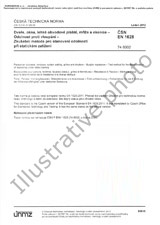We need your consent to use the individual data so that you can see information about your interests, among other things. Click "OK" to give your consent.
ČSN EN 16803-2 (310560)
Space - Use of GNSS-based positioning for road Intelligent Transport Systems (ITS) - Part 2: Assessment of basic performances of GNSS-based positioning terminals
Translate name
STANDARD published on 1.3.2021
The information about the standard:
Designation standards: ČSN EN 16803-2
Classification mark: 310560
Catalog number: 511529
Publication date standards: 1.3.2021
SKU: NS-1018557
The number of pages: 90
Approximate weight : 301 g (0.66 lbs)
Country: Czech technical standard
Category: Technical standards ČSN
The category - similar standards:
Road transportRadio relay and fixed satellite communications systemsIT applications in transport and trade
Annotation of standard text ČSN EN 16803-2 (310560):
Like the other documents of the whole series, this document deals with the use of GNSS-based positioning terminals (GBPT) in road Intelligent Transport Systems (ITS). GNSS-based positioning means that the system providing position data, more precisely Position, Velocity and Time (PVT) data, comprises at least a GNSS receiver and, potentially, for performance improvement, other additional sensor data or sources of information that can be hybridized with GNSS data.
This new document proposes testing procedures, based on the replay of data recorded during field tests, to assess the basic performances of any GBPT for a given use case described by an operational scenario. These tests address the basic performance features Availability, Continuity, Accuracy and Integrity of the PVT information, but also the Time-To-First-Fix (TTFF) performance feature, as they are described in EN 16803-1, considering that there is no particular security attack affecting the SIS during the operation. This document does not cover the assessment tests of the timing performances other than TTFF, which do not need field data and can preferably be executed in the lab with current instruments.
"Record and Replay" (R&R) tests consist in replaying in a laboratory environment GNSS SIS data, and potentially additional sensor data, recorded in specific operational conditions thanks to a specific test vehicle. The data set comprising GNSS SIS data and potential sensor data resulting from these field tests, together with the corresponding metadata description file, is called a "test scenario". A data set is composed of several data files.
This EN 16803-2 addresses the "Replay" part of the test scenario data set. It does not address the "Record" part, although it describes as informative information the whole R&R process. This "Record" part will be covered by EN 16803-4 under preparation.
Although the EN 16803 series concerns the GNSS-based positioning terminals and not only the GNSS receivers, the present release of this document addresses only the replay process of GNSS only terminals. The reason is that the process of replaying in the lab additional sensor data, especially when these sensors are capturing the vehicle´s motion, is generally very complex and not mature enough to be standardized today. It would need open standardized interfaces in the GBPT as well as standardized sensor error models and is not ready to be standardized. But, the procedure described in the present EN has been designed to be extended to GBPT hybridizing GNSS and vehicle sensors in the future.
This EN 16803-2 does not address R&R tests when specific radio frequency signals simulating security attacks are added to the SIS. This case is specifically the topic of EN 16803-3.
Once standardized assessment tests procedures have been established, it is possible to set minimum performance requirements for various intelligent transport applications but it makes sense to separate the assessment tests issue from minimum performance requirements, because the same test procedure may be applicable to many applications, but the minimum performance requirements typically vary from one application to another. So, this document does not set minimum performance requirements for any application
Preview of the standard ČSN EN 16803-2 (310560)
We recommend:
Technical standards updating
Do you want to make sure you use only the valid technical standards?
We can offer you a solution which will provide you a monthly overview concerning the updating of standards which you use.
Would you like to know more? Look at this page.




 Cookies
Cookies
